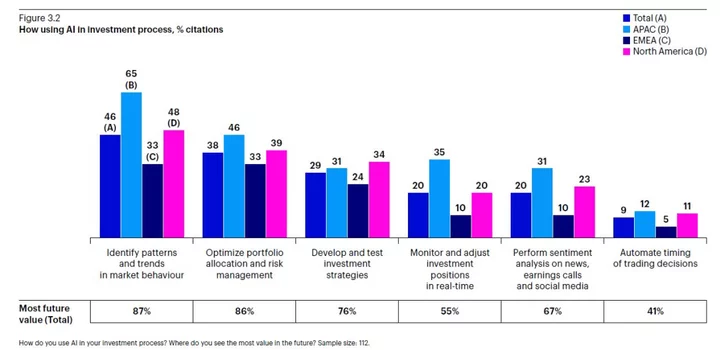
Britain to push ahead with rules for cryptoassets
LONDON Britain said on Monday it would put forward legislation to implement its first set of rules to
2023-10-30 17:30

Quants With $23 Trillion See AI Takeover Even as They Hold Back
The financial world’s computer-loving crowd is preparing for the dawn of a new AI-powered era — but that
2023-10-30 16:19

Your brain doesn’t work the same on Zoom, scientists say
Your brain doesn’t work the same when you speak to someone on Zoom, scientists have confirmed. Neural signalling is significantly less when chatting to someone through a video call rather than having a face-to-face conversation, the new study found. When researchers watched the brain of someone talking in real life, they found that there was a detailed and complex system of neurological activity. On Zoom, however, that was dramatically less. It suggests that there is still something fundamentally lacking about speaking with someone online. People’s faces are not able to light up people’s brains in the same way, the researchers suggest. That is something of a surprise: current models suggest that the brain should process people’s faces in the same way whether they are on Zoom or in real life, given the features of them are the same. But the new study suggests that there really is something fundamentally different between the two contexts. “In this study we find that the social systems of the human brain are more active during real live in-person encounters than on Zoom,” said Joy Hirsch, a Yale professor who was the lead author on the new study. “Zoom appears to be an impoverished social communication system relative to in-person conditions.” To find that, researchers studied people’s brains in real time as well as looking at other signals, such as where people’s eyes moved. As well as increased neural activity, the researchers found that people’s eyes hovered for longer on the real faces, for instance. The two people’s brains also seemed to be more co-ordinated. That suggests that there are more social cues being shared between the two people, they said. “Overall, the dynamic and natural social interactions that occur spontaneously during in-person interactions appear to be less apparent or absent during Zoom encounters,” Professor Hirsch said. “This is a really robust effect.” The study suggests that face-to-face encounters remain very important, even as technology companies and others come up with new ways for us to interact with people remotely, the authors said. “Online representations of faces, at least with current technology, do not have the same ‘privileged access’ to social neural circuitry in the brain that is typical of the real thing,” said Professor Hirsch. The findings are described in a new paper, ‘Separable Processes for Live “In-Person” and Live “Zoom-like” Faces’, published in Imaging Neuroscience. Read More Scientists reveal what talking on Zoom does to your brain – and it’s not good Infrared lights spotted on Uranus could be clue to alien life Elon Musk says X posts with misinformation are ‘ineligible for revenue share’
2023-10-30 15:28

Toyota Global Sales, Output Hit Record 5.6 Million Vehicles
Toyota Motor Corp.’s global sales climbed 8.3% in April to September from a year earlier to a record
2023-10-30 14:45

Elon Musk says X posts with misinformation are now ‘ineligible for revenue share’
Posts on X carrying any misinformation that is corrected by the platform’s crowd-sourced fact-checking system will now be “ineligible for revenue share”, the social media company’s owner Elon Musk has said. “Any posts that are corrected by Community Notes become ineligible for revenue share,” the multibillionaire posted on X on Sunday. Mr Musk said the change aims to “maximise the incentive for accuracy over sensationalism”. The Tesla titan also noted that any attempts to “weaponise Community Notes to demonetise people will be immediately obvious, because all code and data is open source.” Some users were quick to criticise the change, observing that the feature is used not just to correct misinformation, but also to add essential context even if there is nothing wrong with the initial post. The Community Notes feature was first launched by Twitter co-founder and former chief Jack Dorsey in 2021 as a way to debunk misleading tweets. Currently, eligible users on the social media platform can sign up to contribute to Community Notes, which involves sharing a short note of context for any post, including correcting an error or providing essential information that has been omitted. An account can sign up for Community Notes, according to X, if the user has not recently violated the platform’s rules and has been on the platform for at least 6 months. Other users who view the note can then rate the helpfulness of notes with the note garnering the largest consensus surfacing to the top. Then earlier this year, Twitter/X started paying creators on the platform for the first time via a revenue-sharing program that provided them compensation for the ads appearing in their reply threads. But the social media platform has come under increasing scrutiny for its handling of misinformation since Mr Musk bought Twitter for $44bn last year and cut nearly two-thirds of the company’s workforce. The platform’s handling of misinformation has particularly been on focus following the conflict in Israel and Gaza. The European Union also raised concerns that amid the conflict Twitter was not quick to take down problematic content even when it had been flagged by relevant authorities. EU commissioner Thierry Breton noted that Twitter was hosting “fake and manipulated images and facts ... such as repurposed old images of unrelated armed conflicts or military footage that actually originated from video games”. The EU has also opened an investigation into X on the issue, while the company maintained that it has removed hundreds of Hamas-linked accounts in response to the concerns. Read More Twitter takeover: 1 year later, X struggles with misinformation, advertising and usage decline Tesla’s profits dip as Elon Musk goes on rant against staff working from home ‘He brought so much joy’: Heartbroken Friends stars among those paying tribute to Matthew Perry Twitter adds video calling – and lets strangers ring you Elon Musk was ‘almost in tears’ on Tesla earnings call, analyst claims Slack to retire its status account on Elon Musk’s X
2023-10-30 12:49

Mysterious holes discovered on the outside of the International Space Station
If there’s one thing astronauts don’t want to face when out in the endless expanse of space, it’s signs that their station is being sabotaged. And yet, cosmonauts Oleg Kononenko and Nikolai Chubwere forced to face a strange phenomenon during a spacewalk last week. The pair exited the International Space Station (ISS) on Wednesday to fix a radiator which had sprung a leak. And while they were out, they were met by a close encounter of a very strange kind. Inspecting the source of the leak during their outing, Kononenko reported seeing a number of holes on the radiator panel. "The holes have very even edges, like they've been drilled through," he told Moscow Mission Control, according to Space.com. "There are lots of them. They are spread in a chaotic manner." The cosmonauts were given tissues and cloths to soak up any fluid that had seeped out of the radiator, with the pool of liquid coolant described as a growing “blob”. However, Kononenko got so close to the “blob” that one of his tethers became contaminated. This meant that it had to be bagged up and discarded outside the ISS before the cosmonauts could go back inside. The external radiator was mounted on the outside of Russia’s Nauka module – home to a multipurpose laboratory – which was launched in 2021. It was used as a backup to another radiator which regulates the temperature inside the lab. Kononenko and Chub closed a number of valves to cut off the external radiator from its ammonia supply, and it’s believed that the “blob” formed from residual ammonia that was disturbed when the valves were being shut. The toxic liquid certainly wouldn’t have been welcome on board the space station, hence why the two colleagues embarked upon their spacewalk armed with cloths to wipe down their spacesuits and tools. Russian engineers on the ground will use the data they collected to further investigate the cause of the leak and figure out how to fix the radiator. The question now is will they be able to work out where those mysterious little holes came from? Sign up for our free Indy100 weekly newsletter Have your say in our news democracy. Click the upvote icon at the top of the page to help raise this article through the indy100 rankings
2023-10-29 23:57

How Apple gave people access to a library full of classical music – and tried to make it accessible
Earlier this year, Apple launched Apple Music Classical as a standalone music app that comes included in the price of Apple Music. It was an unusual move for a streaming platform perhaps more associated with Drake and Taylor Swift. And building it was a major undertaking, given the vast complexity of classical music libraries and the difficulties in navigating them. Apple Music Classical continues to grow. In its latest move, Apple announced a new partnership between Apple and the London Philharmonic Orchestra with the release of a live recording of Berlioz’s The Damnation of Faust coming on 3 November. This is just one of the partners Apple Music Classical has. From day one, the Vienna Philharmonic Orchestra was a partner. The content from that orchestra is extensive, with recordings dating back to 1929. Some of it is unique to Apple and this exclusive content alone has already been streamed millions of times. Recently, senior staffers at the app talked exclusively to The Independent. Apple Music Classical came about because Apple realised that classical artists and fans were really not being served well by streaming. As part of its mission to use its engineering knowhow to fix this, it bought Primephonic, widely recognised as the classical streaming platform that succeeded where others had failed. It took more than a year of work before Apple was happy with what it had created and its release to a highly positive response. Now, classical music lovers don’t have to clamber past Justin Bieber and Taylor Swift to get to Bach and Rachmaninoff. Classical music provides challenges other kinds of music don’t, or at least not to the same extent. Instead of playing an album, artist or track, classical lovers have favourite composers, orchestras, soloists and so on. The search parameters are mind-boggling. Apple is well-equipped, with more classical music than anywhere else on the planet, and Primephonic’s brilliant data metrics were a starting point from which Apple’s engineers and expertise transformed the experience. Want to listen to Vivaldi’s Spring from the Four Seasons? Apple has 1,243 versions for you to choose from. If that sounds overwhelming, Apple has a solution: careful navigation with sophisticated search. Just as Apple Fitness+ has a mantra that everybody is welcome, no matter their fitness level or knowledge, Apple Music Classical is designed for seasoned devotees and newcomers alike. “If you didn’t know much about the world of classical, Apple Music Classical offers a structure so you can get into it. It’s centuries of music, right, so where do you start? It gives you an opportunity to get some perspective on it, explains Mariana Pimenta, who works in operations at Apple Music Classical, saying: “We don’t expect everybody who downloads it to be a professional musician, and we want everyone to experience classical music. Our goal is to bring as many people as possible to this service.” Marina Boiko is an editor. She goes on, “The story of classical is a great place to start and we’ve made sure there’s enough beginner-friendly content, such as playlists of periods or genres.” Not all traditional classical listeners will be especially tech-savvy, but that may not be a problem, as Guy Jones, global head of classical editorial, explains. “Lots of classical fans are new not just to technology but to streaming. The whole point of this product is to bring classical to streaming. It’s the musical genre that wasn’t really being streamed because the experience was previously so bad. The technical side of things may be less of a problem, especially as Apple’s guidelines around human interface design are baked into our product, but the challenge is more in explaining that streaming opens up opportunity and accessibility. “When I was first getting into classical music, I had to buy CDs. I had to choose carefully what CD I wanted to buy each month. The ability now to just pick a random composer and ask, ‘Do I like this composer?’ That ability to let you dip your toe in the water, I think that’s the real power of something like Apple Music Classical, and not just for beginners, for the experts too.” The absence of the Primephonic app while Apple Music Classical was being developed was down to getting it right, Carlos Anez Gomez, from the metadata team, says. “It took us time, but it paid off because we needed to take care with every single point and I think we managed to do it, both in human terms and the algorithms: we made a great balance between computer work and human work. Where Primephonic had a relatively small catalogue, Apple Music Classical has a huge number of albums, for example.” Boiko adds, “No one knows everything that has ever been recorded in the history of classical music. And in that sense, we put a lot of emphasis on the discovery element, especially when it comes to the underrepresented composers.” Each work has its own place, called the work page in Apple Music Classical, where you can find all the recordings, so it’s easy to compare different versions. Primephonic’s unique data continues to be essential. “The structured metadata, that’s the uniqueness of it,” Boiko says. “It makes it easy to find things even if you don’t know what you want. That structure, it’s what classical music apps needed and didn’t have. There are many ways not to get lost because you can search by ensemble, by orchestra or even by instrument.” The work page is important, then. As Gomez says, “People discovering music can check this work page and say, ‘Aha, there is a new piece by a certain composer and I have a work page which will give me all the information that I need.’ I discover music every day going through this.” Another key element is the playlist. Boiko goes on, “Playlists are structured in different ways. So, genre playlists are the best way for you to start listening to classical music. The story of classical is a narrated cycle, that guides you through all the centuries of music. “Then there are more specific playlists. You can listen to duets and trios and quartets or quintets and then it gives you an overview of all this chamber music and maybe something that you wouldn’t necessarily find on other platforms.” Jones explains the importance of the human touch. “I don’t think it’s widely known that at Apple it’s human curators behind the playlists. The assumption is that it’s all algorithms now. But for classical that’s a particularly important point, because it’s such a huge genre. People talk about classical like it’s one block and it’s really a thousand years of music from pretty much every country in the world. Our job is breaking classical into smaller chunks, to give people the agency to discover what they like, and to go down their own rabbit holes and feel more confident exploring.” How does Apple Music Classical find a way to appeal to everyone? Jones explains, “It’s a really hard thing to do, to cover that broad spectrum. It’s a constant tightrope walk because you have very knowledgeable people with clear ideas about what they think the genre is as well as trying to please newcomers. We strike that balance in terms of our editorial strategy by being as authentic and genuine as possible and conveying our passion for classical. For those hardcore classical nerds a big part of the product is the browse and the search as much as it is the editorial, I think for the newcomers, they use the editorial a lot more if they don’t know what to search for.” As it grows, there’s a lot more for Apple to do, and the team are working on changes and improvements. Here’s a last word from each of them about why the app matters. Gomez says, “People will discover that along with any classical library that they can have their access quickly to any recording they have.” As Boiko says, “It’s a lot of music. I think there’s not one person that wouldn’t find something they would love here.” Boiko has a different take on the importance of Apple Music Classical: “Maybe the listeners will have emotional responses to it. And at the end of the day music is there to make our lives better. It definitely enriches our lives.” Finally, Jones comments, “The thing about human curation is we are ultimately making a human decision. And so, for instance, if you choose a recommended recording for Beethoven’s Fifth Symphony, you’re instantly upsetting everyone who has a strong opinion about their favourite. That’s what comes with the human aspect: this is our opinion, our recommendation, but you have the other recordings there to explore if you want them.” Read More Apple is about to add a host of new features to the iPhone The Apple Watch feature everyone has been waiting for has finally arrived Apple’s plans for the future of AirPods might just have been revealed Apple TV+ and other subscriptions are about to get a lot more expensive What to expect Apple’s surprise, spooky upcoming launch Apple announces surprise event: ‘Scary fast’
2023-10-29 18:50

G-7 Trade Chiefs Slam Weaponization of Economic Dependencies
Trade chiefs of the most advanced economies criticized some nations for exploiting the commercial vulnerabilities of others to
2023-10-29 15:23

LAFC 5-2 Vancouver Whitecaps: Player ratings as Bouanga's brace seals game one win
Player ratings from LAFC's 5-2 triumph over Vancouver Whitecaps.
2023-10-29 10:54

When was the last time Kansas beat Oklahoma in football?
Curious about the last time Kansas beat Oklahoma in football? Find out here!
2023-10-29 04:55

Musk says Starlink to provide connectivity in Gaza through aid organizations
(Reuters) -Elon Musk said on Saturday that SpaceX's Starlink will support communication links in Gaza with "internationally recognized aid organizations".
2023-10-28 23:24

Cruise’s Suspension Marks a Setback for GM CEO Barra’s Vision
A couple of hours after Chief Executive Officer Mary Barra finished telling Wall Street analysts that the Cruise
2023-10-28 23:19
